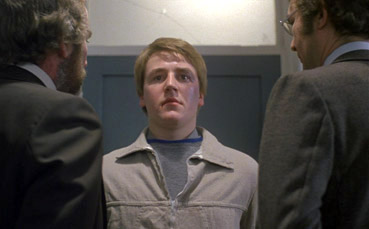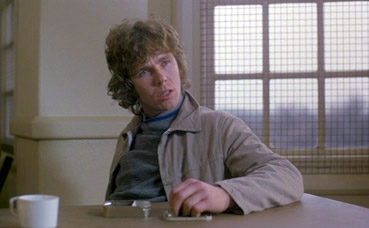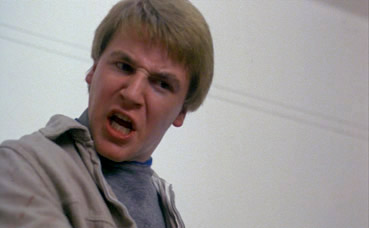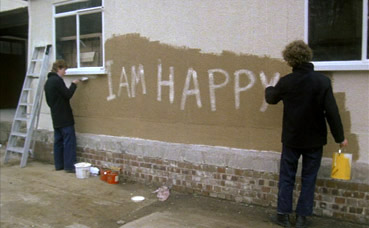| "Right
Banks, you bastard! I'm the daddy now! Next time I'll
fucking kill you!" |
| Carlin snatches control from the resident daddy Banks |
As
1979 began, I was in my second year of film school. There were something like eight cinema screens in
the immediate area which I made a point of visiting at least three
times a week. The local arts centre was where you went
to see the older classics or the more recent foreign
language releases, while the mainstream and more successful
independent American releases could be caught at one
of three very large screens within walking distance
of the college. Many of these films were decent if unremarkable,
but just occasionally were extraordinary enough to convince
you that attending the first week of its release made
you part of cinema history (Alien, Halloween).
What rarely played in either location were British movies, and those that did tended to focus on the aristocracy.
This was the one thing I felt was missing from my regular
trips to the cinema, films that reflected my own life,
had characters that spoke as I did, that took place in believable settings
and had stories that were drawn from real life. Where were
the British realist films that had seemed so crucial
during the sixties, from Jack Clayton's Room
at the Top (1959) through to Ken Loach's seminal Kes (1969)? Even Loach had fallen into
the cinematic wilderness at this point in his career and was working only sporadically
in TV. So my hopes were high when I queued up to buy
my ticket for Scum. I emerged from
the cinema bristling with excitement. After close to
a year made up largely of mainstream Hollywood products, this
was a thumping kick in the bollocks, brutal and confrontational,
but also intelligent and searingly well directed and
acted. It seems ironic that this cinema feature was
my introduction to the work of one of the country's
greatest directors of televisual drama, Alan Clarke.

Scum was Clarke's first film made specifically for the cinema,
but was never intended to be that way, having been commissioned
as a TV play and then banned (for more details of this
and an outline of the plot, see my review of the BBC
version). The feature was effectively a
remake of this, using the same script and employing many of the same actors, but with a few crucial changes. The
most obvious one to those who have watched the TV version
first is the stronger language. Some have seen this
as part of a the process of sensationalising the story
for the wider cinema audience, but I could not disagree
more – in the original, racial abuse is used as a method
of verbal bullying by guards and inmates alike and
the swearing is a logical and non-racial extension of
that; had the TV play been made ten years later when
restrictions on language had been eased for British
television, then I have no doubt that this is how the
script would have played from the start. Indeed, given
the characters and the environment, the idea that such
language would not be used is patently absurd,
and its inclusion here adds to both the realism and
menace of the threats and has contributed to most of
the film's most quoted lines. Carlin's confrontation
with rival black 'daddy' Baldy, for instance, is transformed
by just one word: "Where's your tool?" "What
fucking tool?" Wallop. "THIS FUCKING TOOL!"
Now THAT is a threat.
Crucial
to selling this, though, are the altogether more confident
performances of the leads. No longer first-timers and
well rehearsed in their parts, they now inhabit their
roles as if born to them. This is especially evident
in Ray Winstone's electrifying performance as Carlin
– where his more low-key delivery worked perfectly for
the matter-of-fact approach of the TV play, his burning,
ferocious anger here propels the story forward like
a bulldozer on steroids. Nowhere is this more evident
than in the scene in which he confronts and defeats incumbent
daddy Banks and his cronies – this was always a great
scene, but Winstone's calm tooling-up at the snooker
table ("Yeah, well, carry on"), the viciously
physical beatings
and his furiously delivered pronouncement to the defeated
Banks, "I'm the daddy now! Next time I'll fucking
kill you!" leaves you in no doubt that from now
on Carlin is in charge and that it's going to take a force
of some considerable power to dislodge him. It is no
small testament to my identification with Carlin that
when I first watched this scene I nearly stood up in the
cinema and cheered. Looking back, this generates the very
same visceral power as when John C. Macreedy suddenly unleashes his jujitsu skills in John Sturges electrifying Bad Day
at Black Rock (1955). No surprise, then, that on the commentary tracks
of both this and the BBC version, host Nigel Floyd draws
comparisons between Scum and classic
western plots and characters.

Once
again, the flipside of Carlin's power-though-aggression
approach is Archer, the intellectual misfit determined
to cause as much trouble for the system as he can using methods that his custodians, particularly the overtly religious governor,
have no experience of handling. He was played in the original by David Threlfall, but his contract with the Royal Shakespeare
Company forced a re-casting, and here Clarke struck
gold with the talented Mick Ford, a young actor relatively new to
film and TV (his only previous film role was in Jack
Gold's The Sailor's Return the previous
year) who works such wonders with the role that he almost
steals the film from Winstone.
His cocksure gameplaying with the routines imposed on
the inmates is both hilarious and inspiring, a smart and
non-violent fuck-you to a system that only knows how
to respond with aggression.
Personal favourite Archer moments include the comically mannered delivery of his name and number when
called before the governor, whom he
then outrages by claimeing he feels drawn to Mecca; the drawn-out
pronunciation of the word "Trust" when baiting
the Matron during a discussion period (his qualifying
explanation suggests an intellectual superiority on his part that
she clearly finds intimidating); and the painting of
the words "I am happy" on a wall he is supposed
to be decorating. Ford's interpretation of the role
differs from Threlfall's enough for both to be enjoyed
for different reasons – my preference for Ford's interpretation
is no slight on Threlfall, its just that at times
the Archer played by Mick Ford reminds me of me, at least it would had
I even a fraction of Archer's self-control and natural cool.
The
supporting cast are as impressive as they
were in the original, the one notable improvement being Richard Butler's delicious turn
as prison Governor Mr. Baildon, replacing the original's Peter
Powell and clearly relishing the lines
given to him by Minton, investing almost every word
with an extraordinary degree of self-righteous judgment.
His delivery turns even the straightforward into something memorable: just listen to how he says the single word
"Indeed" when confronted with Archer, a word
that simply slipped by in the original. Few who have
seen this version will not smile at the memory of "Ah,
Archer," or "We'll have no more talk of MECCA!"
Matching
this increased confidence on the part of the actors
is Clarke's sometimes more animated direction. I've
met very few film-makers who would not relish a second
stab at a cherished project, and this includes the Hollywood
exulted, evidenced by Spielberg's re-working of Close
Encounters and George Lucas's endless tinkerings
with the few works he has directed. Clarke takes
this opportunity not just to adjust his camera placement
(witness the telling reverse of angle on Carlin after
has asked for a single cell and is dismissed by the
warder advising him to watch his step), but also the handling
of some key scenes. It is here that the director began
to experiment with his 'walking shots', long takes following
characters as they move between locations, most effectively
used to focus on Carlin when he seizes power from Banks.
This adds an undeniable urgency and vigour to an already
gripping scene and was a signpost of things to come,
when Clarke would later shoot entire films on Steadicam
using walking shots (although the Steadicam was invented
and in use by now, the walking shots in Scum were done hand-held), culminating in extraordinary, groundbreaking works like Road and Elephant.

Another
area in which it was claimed that the feature sensationalised
a story told with more subtlety in the TV play is the
upping of the violence, but this simply isn't
the case. Key scenes used in evidence include the greenhouse
rape and the suicide of Toyne following the death of
his wife, but both scenes were in the original and fell
victim to post-production trimming (the rape was shortened,
the suicide completely removed) in an effort to appease
those wanting to stop it being shown. Indeed, I would
argue that Carlin's bathroom assault on Banks is more violent in the original, the initial ramming of his
head into the sink being shown in close-up, whereas here
it is covered in wide shot. Both the notorious murderball sequence
and the final riot are virtually identical in both versions
(right down to the kinetic tracking shot during the pre-riot
"Dead!" chant), and lest there be anyone out
there in these more cautious times who believes the
murderball match is a flight of fancy on the part of
the writer and director, be advised that we used to
play it once a term at my humble comprehensive school
– and it really was that violent every time.
What
surprised me most watching Scum again
for the umpteenth time is how much of a wallop it still
packs. With too much British cinema consisting of either
twee middle class romances or ludicrous mockney gangster
dramas, Scum is still around to remind
us that once upon a time British cinema was urgent,
realistic and had something worth saying. It also had
balls the size of asteroids.
For
anyone familiar with the now budget-priced UK release
of the film from Odyssey Video, the print on the Blue
Underground disc is going to come as a major revelation.
Where the Odyssey print is framed 4:3, grainy, and blighted
by a few scratches and dust spots, this new Blue Underground
transfer, released as part of The Alan Clarke
Collection, is as close to perfect as you could
hope for a low budget British film from the late 70s.
Framed 1.66:1 and anamorphically enhanced, the print
is clean and sharp, with spot-on contrast and colour. Grain is still evident, but minimal and
never intrusive. A very nice job indeed.

There
are three sound mixes available: the original mono, a Dolby
2.0 surround track and a 5.1 remix. Obviously the mono track
is the most faithful to the original release, and as with
the BBC version the on-location recording was first-class and is cleanly reproduced here. If anything, I'd
say the location recording on the original BBC version actually
has the edge on this one, at least in terms of clarity and
acoustics. The Dolby 2.0 track has better fidelity and spreads
the still essentially mono sound across the front soundstage
a bit more, while the 5.1 track has just slightly more clarity
and pushes some ambient sound to the rear speakers,
though you have to stick your ear against them to hear this
most of the time.
The
menu offers English subtitles only, but there seem to be
two subtitle options once in the film, both English and
identical to each other.
The
key extra feature on this disk has to be the commentary
track with lead actor Ray Winstone, hosted
by Nigel Floyd. Putting aside the fact that it appears
to have been recorded in an empty warehouse (at one point
you can hear some drilling going on somewhere in the background),
this is an excellent track – Winstone is still as down-to-earth
and direct as ever and has plenty of great anecdotes
about the filming. Some of them are well known, such as
Clarke's way of firing up the actors for the murderball
sequence, while others – when actor John Judd (playing
warder Mr. Sands) got a bit 'realistic' when losing his
rag at Banks for letting Carlin beat him and feared genuine recrimination during the riot scene – were new to me. The language
is stronger than on most commentaries, stronger than the
film in places, but this adds to the sense that you're
sitting down with Winstone for a pint and a chat about
the film. Initially busy, it trails off a little towards
the end, but is still a fine inclusion.
Also
included are Interviews with producer Cliver
Parsons and writer Roy Minton. Running a
total of 17 minutes, this extra has been transferred over
from the 1999 Odyssey region 2 release and is very honestly
announced as a pair of EPK interviews. Shot on video and framed
4:3, it includes extracts from the film, giving you the
chance to compare how it used to look on DVD before Blue
Underground got its hands on it, though they do take up a sizeable
chunk of this extra, too much in places (notably Archer's
talk with Mr. Duke, which is shown in its entirety). The
interviews themselves are very worthwhile – Parsons gives
some useful background on the genesis of the film version
and the controversy that followed its release, and Minton
muses on one of the key differences between the BBC and
film versions. Both men offer interesting retrospective
viewpoints on the film and its characters.
Poster
and Stills Galleries includes 3 posters for the film (including one for a double-bill
with Quadrophenia which I still own),
32 production stills (which are reproduced at a decent
size) and 4 video covers.
Finally
there is the Theatrical Trailer,
which is framed 1.85:1, anamorphically enhanced and in
surprisingly good shape. Interestingly it has a music
score, while the film itself has none, and a voice-over
recorded by Ray Winstone as Carlin specifically for the
trailer. It runs for 3 minutes 15 seconds, is edited in
a most rudimentary style, but still sells the film quite
well.
It still has its naysayers, but for my money Scum
is one of the finest British films of the 70s, which makes
it one of the greatest British films of modern times, end
of story. Although already available on a now budget price
UK DVD, Blue Underground's version blows it out of the water
with its pristine anamorphic transfer, its multiple soundtrack
options and its fine commentary track, and it even includes
the interviews from the UK release. Following on from the
inclusion of the BBC original, this is reason 2 of 6 to
immediately buy The
Alan Clarke Collection.
|